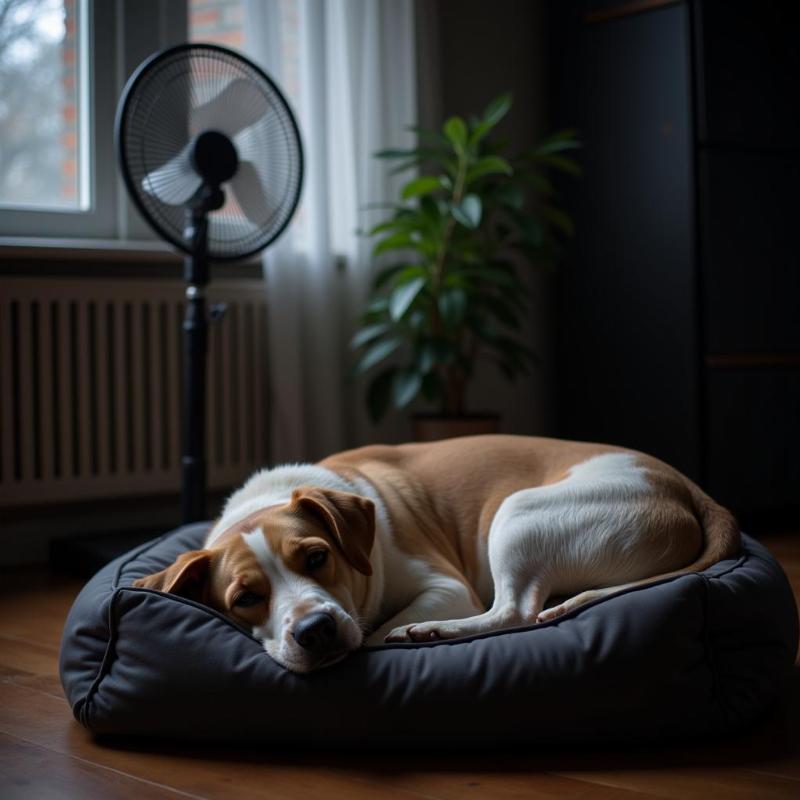Dog panting is a normal way for dogs to regulate their body temperature. However, if your furry friend is only panting at night, it could signal an underlying issue. This article explores the potential reasons behind nighttime panting in dogs, offers solutions, and guides you on when to seek veterinary care.
Why is My Dog Panting Only at Night?
Several factors can contribute to nighttime panting in dogs, ranging from environmental factors to underlying medical conditions. Let’s delve into the most common culprits.
Environmental Factors
Is your home too warm at night? Dogs can’t sweat like humans, so they rely on panting to cool down. A stuffy bedroom or a thick blanket could be the simple explanation. Even seasonal changes, like summer heat, can make nighttime panting worse. Also, consider anxiety. Separation anxiety, especially if your dog sleeps alone, can manifest as nighttime panting.
Medical Conditions
While environmental factors are often the cause, underlying medical conditions can also lead to nighttime panting. Pain, especially from arthritis or other joint issues, can make dogs uncomfortable and pant more at night. Respiratory problems like asthma or collapsing trachea can also cause difficulty breathing and subsequent panting. Heart conditions, such as congestive heart failure, can also lead to increased panting, particularly at night. Cushing’s disease, a hormonal disorder, can also cause increased panting.
Breed Specific Considerations
Brachycephalic breeds, like Bulldogs and Pugs, are more prone to breathing difficulties and may pant more, especially in warmer temperatures or when stressed. Their shortened snouts make it harder for them to regulate their body temperature effectively.
What Can I Do to Help My Dog Stop Panting at Night?
Addressing nighttime panting depends on the underlying cause. Here are some steps you can take:
- Ensure a Comfortable Sleeping Environment: Keep the room cool, provide a comfortable bed, and ensure good ventilation. Consider a cooling mat for hot summer nights.
- Reduce Anxiety: If you suspect anxiety, try a calming pheromone diffuser or a snug-fitting shirt designed to reduce anxiety. Create a comforting bedtime routine and offer a safe, quiet space for your dog to sleep.
- Manage Pain: If your dog suffers from arthritis or other joint pain, consult your veterinarian about pain management options. They might recommend medications, supplements, or physical therapy.
- Address Underlying Medical Conditions: If you suspect a medical issue, schedule a veterinary appointment. Early diagnosis and treatment are crucial for managing conditions like heart disease or Cushing’s disease.
 Dog Sleeping Comfortably in a Cool Room
Dog Sleeping Comfortably in a Cool Room
When Should I Take My Dog to the Vet?
If your dog’s panting is sudden, excessive, or accompanied by other symptoms like bluish gums, weakness, or vomiting, seek immediate veterinary attention. These could be signs of a serious medical emergency.
Conclusion
Nighttime panting in dogs can be caused by various factors, from simple environmental issues to more complex medical conditions. By carefully observing your dog, adjusting their environment, and seeking professional veterinary advice when necessary, you can help ensure your furry friend gets a good night’s rest. Remember, addressing the underlying cause is key to resolving this issue and ensuring your dog’s well-being.
FAQ
- Is it normal for dogs to pant at all? Yes, panting is a normal way for dogs to regulate their body temperature.
- When should I be concerned about my dog’s panting? If the panting is excessive, sudden, or accompanied by other symptoms like bluish gums or weakness.
- Can anxiety cause panting in dogs? Yes, anxiety, especially separation anxiety, can manifest as panting.
- How can I make my dog’s sleeping environment more comfortable? Keep the room cool, provide a comfortable bed, and ensure good ventilation.
- What medical conditions can cause panting in dogs? Heart conditions, respiratory issues, Cushing’s disease, and pain.
Beautdogs.us is your premier resource for all things dog-related in the USA. We offer expert advice on dog breeds, care, and lifestyle, providing a trusted source of information for both new and experienced dog owners. Explore our website for comprehensive guides, product reviews, and valuable insights to help you navigate the joys and challenges of dog ownership. Contact us today for personalized support! Email: [email protected], Phone: +1 501-555-7529. Visit Beautdogs.us for more information.